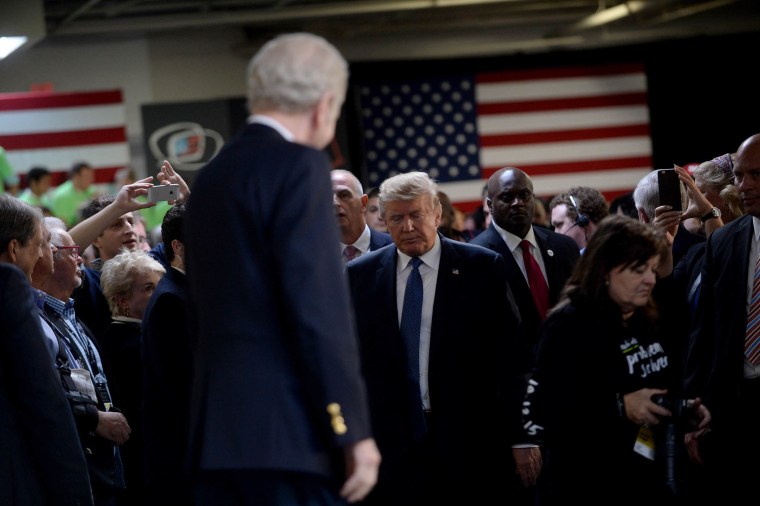Manchester, New Hampshire – At the height of a primary season in which candidates are jockeying for support from the hardcore party base, the No Labels Problem Solver Convention offered up an unusual twist on Monday: asking them to show they can cooperate.
Eight presidential candidates from both parties were set to speak at the event, including Donald Trump, Chris Christie, Lindsey Graham, George Pataki and John Kasich on the GOP side, and Bernie Sanders, Jim Webb and Martin O’Malley on the Democratic side. The event was hosted by former Sen. Joe Lieberman and former Utah Gov. Jon Huntsman, two ex-presidential candidates who now serve as No Labels co-chairs.
RELATED: Trump pressed by skeptics at bipartisan event
It’s hard to whip up too much energy behind non-partisan civility in a polarized country, but No Labels did surprisingly well within the confines of its conference. The event began with an appearance from the group’s neon spandex-clad mascot Mr. Problem Solver, who carried a shield and helped lead the audience with chants of “When I say problem, you say solver! Problem! (Problem!) Solver! (Solver!).”
Trump, who spoke early in the day, faced a tough crowd. Perhaps sensing the mood of the audience, Trump made some effort to tailor his message. He talked up his admiration for President Ronald Reagan’s work with Democratic Speaker Tip O’Neill and argued that his work navigating city government and labor unions in renovating New York’s Wollman Rink proved he could manage competing interests. Before the speech, he praised Sanders’ skeptical take on trade, describing him as the only other candidate in either party who regularly raises his concerns about trade deals with China.
Despite his efforts, it was clear that Trump, who’s used to speaking to conservative audiences and crowds of supporters on the trail, was at odds with the mixed political crowd.
After a tepid reception for his speech, the audience offered the loudest applause of his appearance during a Q&A when a woman told Trump that he was “divisive.”
“The problem we have in this country is we have people now who don’t fight back,” Trump responded.
The audience cheered again when another questioner said, ”I don’t think that you’re a friend to a woman.”
“I respect women, I love women, I cherish women,” Trump said.
Even long after Trump left, there was a standing ovation during a panel with actors like Wayne Knight (Seinfeld’s Newman) and Dean Norris (Breaking Bad’s Hank) when a woman implored the press: “Please don’t make today about Donald Trump.”
Sanders, who also frequently speaks to crowds of thousands of frenzied supporters, addressed a less enthused audience during his video address. After a warm greeting, the room was mostly quiet, with a number filing out of their seats, texting on their phones or chatting with neighbors as he rattled off statistics about inequality.
RELATED: Latest polling challenges assumptions about Trump, Clinton
"At a time when the 15 wealthiest people in this country increased their wealth by $170 billion dollars in the last two years, I would significantly increase the estate tax on inherited wealth of more than $3.5 million dollars," Sanders said.
Sanders did earn some cheers for asking political leaders and voters to "not try to demonize people who may have disagreements."
It was the kind of event where a relatively moderate Republican like Sen. Lindsey Graham couldn’t have been more at home. The senator used his remarks to play up his centrist take on immigration and the environment.
"How many here think climate change is real?” Graham asked the crowd. “I do too."
New Jersey Gov. Chris Christie, getting into the spirit of things, decried gridlock in Washington during his own Q&A session and dismissed the House GOP’s ongoing difficulty to produce a speaker as a distraction.
"Who cares?" Christie said. “They don’t get anything done."
On the policy front, Christie talked up his plan to means test Social Security and raise the retirement age to shore up the program’s finances rather than raise payroll taxes. After taking a question on why the District of Columbia doesn’t have representation in Congress, Christie said he hadn’t given the issue enough thought to take a position, but “I don’t think adding another person to Congress is going to help.”
Pataki used his remarks to promote his work reforming drug laws in New York with hip-hop mogul Russell Simmons and, like Graham, urged Republicans to acknowledge the threat of climate change and propose a credible government response. "Republicans have to embrace science," he said.
Kasich concluded the day's program by promising to compromise with his colleagues across the political aisle, but drawing the line at raising tax revenue to help balance the budget -- a major Democratic demand in previous negotiations on the issue.
"I think compromise is part of it, but you can never compromise beyond where you can't look yourself in the eye," Kasich said.
